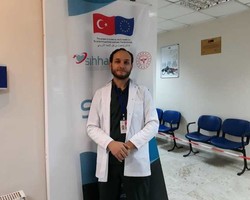Syrian doctor Sameer: “What fills me with gratitude is the way my patients look at me”

WHO Turkey implementing Partner Doctors Worldwide
May 2020, Bursa – When the armed conflict broke out in Syria in 2011, Sameer was 31 years old and working as a resident doctor at the department of neurosurgery at the Al-Razi Hospital in Aleppo, Syria. As the conflict worsened, Sameer finally had no choice but to flee to Turkey together with his wife and one-year-old son. Settling in the Turkish city of Bursa near the Marmara Sea was not uncomplicated. “I couldn’t return to Syria to finish my education,” Sameer explains. “I thought I would have to bury my dream of becoming a neurosurgeon.”
To make matters worse, back in 2013 there were no legal ways to find employment in Turkey as a Syrian refugee. Sameer eventually found a job as an assistant surgeon at the Tel Abiad Hospital in northern Syria, operated by the Qatar Red Crescent Society. With over 1000 kilometres now separating him from his family, he often worked for weeks without seeing his wife or son.
“After having worked in Tel Abiad for only six months, I had to flee back to Turkey again, and this time for good. I left behind a country taken over by war,” says Sameer.
A window of opportunity for Syrian health professionals
Sameer found himself back in Turkey, facing unemployment and uncertainty, and had to find other means to generate income to provide for his family. A year and a half later, however, an unexpected opportunity presented itself. An adaptation programme for Syrian doctors and nurses was launched, financed by the European Union and run jointly by the WHO Country Office in Turkey and the Turkish Ministry of Health. Through the programme, “Improved access to health services for Syrian refugees in Turkey”, Sameer was able to enroll in both theoretical and practical training. He was one of the first who graduated and now works at a Migrant Health Centre in Bursa that provides primary health care services in Arabic and receives up to 100 patients a day.
Despite the workload, he tries to give every patient the attention and care they need. “I very much value the opportunity to work in a decent environment while being able to develop as a medical professional. Aside from generating income for my family, what really fills me with gratitude is the respect I receive from my patients – the way my patients look at me.”
Back to the surgeon’s table
Throughout the duration of the programme, Sameer has been able to attend trainings and develop his skills. “It is great to be able to work as a part of the Turkish health care system. We are receiving continuous on-the-job supervision and are provided with opportunities to grow professionally,” says Sameer.
Many of his fellow doctors who fled Syria settled in various countries in the European Union, but Sameer sees his future in Turkey where his daughter and second son were born. June 2020 marks his seventh year in the country and he hasn’t given up his dream of becoming a surgeon.
“You know, Turkey has an amazing scientific base for medicine. The person who has influenced me the most on a professional level is the Turkish neurosurgeon, Mahmut Gazi Yaşargil. He was a pioneer in micro-neurosurgery and is still practicing and teaching,” Sameer explains. “My hope is to obtain Turkish citizenship someday and continue to pursue a career in neurosurgery here in Turkey. I miss surgery very much; for me it’s like the knighthood of medicine.”
Cooperation for targeted and tailored support
The “Improved access to health services for Syrian refugees in Turkey” programme and its Refugee Health Training Centers provide primary health services in seven provinces.
The programme supports national health care services by increasing the capacity of Syrian health staff and providing high-quality health-related services to Syrian refugees and impacted host communities in Turkey. The programme has supported its beneficiaries in many ways, such as:
- providing 42 812 beneficiaries with free psychosocial services;
- providing training that has been completed by 173 doctors, 110 nurses and 606 bilingual patient guides;
- providing mental health and psychosocial support services training to 402 Syrian and Turkish doctors who are now certified to exercise their profession; and
- employing 126 Facility Health Support Staff to support the provision of health services, including psychosocial counselling, to Syrian refugees in the provinces of Ankara, Gaziantep, Hatay, Istanbul, Izmir, Mersin and Sanliurfa.



